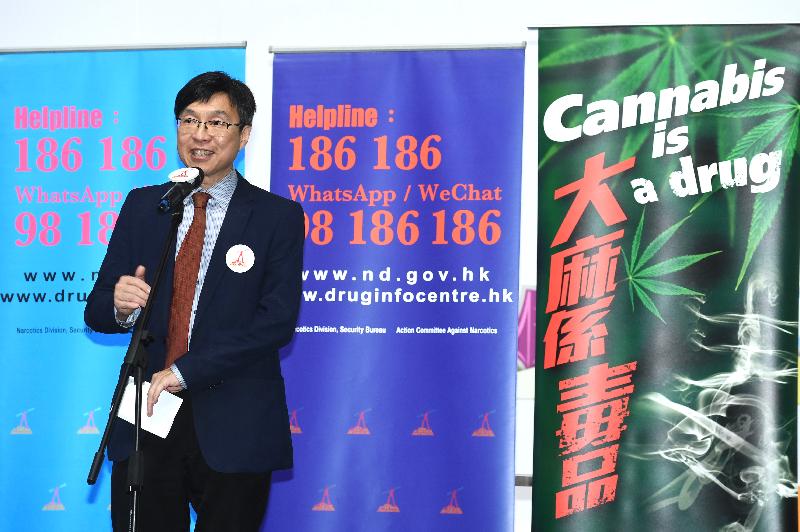Reported drug abusers in further decline but cannabis abusers rise by 8 per cent (with photos)
******************************************************************************************
According to the latest figures from the Central Registry of Drug Abuse (CRDA), the total number of reported drug abusers in the first three quarters of 2019 decreased by 19 per cent (from 5,739 to 4,625) compared with the same period in 2018. The number of reported drug abusers aged under 21 also decreased by 10 per cent (from 383 to 346).
In the first three quarters of 2019, the total number of reported narcotic analgesic abusers dropped from 3,194 to 2,389, recording a 25 per cent decrease compared to the same period last year. The total number of reported psychotropic substance abusers (PSAs) also decreased by 13 per cent (from 3,263 to 2,849) compared to the same period last year. Among the newly reported cases, the number of PSAs (at 1,026) remained considerably higher than that of narcotic analgesic abusers (at 124).
Heroin remained the most common type of drug abused among all reported drug abusers, but the number of reported abusers decreased by 25 per cent (from 3,193 to 2,387) compared with the same period last year. Methamphetamine (commonly known as "Ice") continued to be the most common type of psychotropic substance abused; the number of reported abusers decreased by 15 per cent (from 1,241 to 1,055) compared with the same period last year.
However, the number of reported cannabis abusers increased by 8 per cent (from 365 to 393). For reported young drug abusers aged under 21, cannabis continued to be the most common type of drug abused, followed by cocaine and "Ice". Compared to the same period last year, the number of reported cannabis abusers aged under 21 increased by 40 per cent (from 117 to 164), while that of reported cocaine and "Ice" abusers decreased by 32 per cent (from 211 to 144) and 28 per cent (from 71 to 51) respectively.
The number of newly reported drug abusers decreased by 14 per cent (from 1,353 to 1,169) compared with the same period last year. About half (48 per cent) were young adults aged between 21 and 35. The median history of drug abuse of newly reported abusers (i.e. the time for abusers to be reported to the CRDA by reporting agencies from their first drug abuse) was 5.6 years, compared with 4.7 years in 2018, indicating that hidden drug abuse still requires attention.
The CRDA figures for the first three quarters of 2019 are available on the Narcotics Division's (ND) website (www.nd.gov.hk/en/index.htm).
The ACAN Chairman, Dr Ben Cheung, said, "The rise in the number of reported cannabis abusers, especially among young people aged under 21, remains a cause for concern. Cannabis is addictive and can cause serious harm to mental health, may induce anxiety and hallucination, and increase the risks of respiratory problems and cardiovascular diseases. Members of the public should correctly understand the harms of cannabis abuse, pursue a healthy lifestyle and refrain from drug temptations."
The Commissioner for Narcotics, Ms Ivy Law, said, "Some overseas jurisdictions have earlier legalised the recreational use of cannabis, and have in recent months further broadened the scope of products that can contain cannabis. Products containing cannabis could appear in different forms, including food, drinks, topical products for applying to skin, hair or nails, as well as cannabis extract. These products may be available for sale in local stores of these jurisdictions. Members of the public should pay attention to the packaging labels of the products concerned while making purchases, and should not bring such products to Hong Kong to avoid breaching the law inadvertently."
After the meeting, Dr Cheung; the Chairman of the ACAN Sub-committee on Preventive Education and Publicity, Mr Chan Wing-kin; the Chairman of the ACAN Sub-committee on Treatment and Rehabilitation, Professor Cheung Yuet-wah; and Ms Law, with the support of the Vice-chairman of the District Fight Crime Committee (DFCC) (Wan Chai District), Mr Yeung Ka-shing, distributed anti-drug leaflets and souvenirs at the 54th Hong Kong Brands and Products Expo at Victoria Park to appeal to members of the public to remain vigilant and stay away from drugs, especially during the Christmas and New Year holidays. Persons coming across drug problems can seek help through the ND's instant messaging service 98 186 186 or 24-hour hotline 186 186.
Other participants at today's event included ACAN members Mr Chan Man-ho, Mr Fan Hoi-kit, Miss Li Ka-yan and Dr Annissa Lui; member of the ACAN Sub-committee on Preventive Education and Publicity Mr Ryan Wong; and member of the DFCC (Wan Chai District) Mr Lui Hon-fai.
Ends/Friday, December 13, 2019
Issued at HKT 19:39
Issued at HKT 19:39
NNNN







